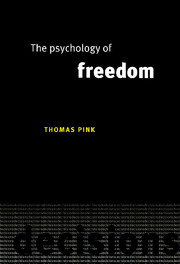Book contents
- Frontmatter
- Contents
- Acknowledgments
- Introduction
- 1 Agency and the will
- 2 Scepticism about second-order agency
- 3 Decision-making and freedom
- 4 The Psychologising conception of freedom
- 5 Decision rationality and action rationality
- 6 Decision-making and Teleology
- 7 The Regress argument
- 8 In defence of the Action model
- 9 The special-purpose agency of the will
- Conclusion
- Bibliography
- Index
Conclusion
Published online by Cambridge University Press: 31 August 2009
- Frontmatter
- Contents
- Acknowledgments
- Introduction
- 1 Agency and the will
- 2 Scepticism about second-order agency
- 3 Decision-making and freedom
- 4 The Psychologising conception of freedom
- 5 Decision rationality and action rationality
- 6 Decision-making and Teleology
- 7 The Regress argument
- 8 In defence of the Action model
- 9 The special-purpose agency of the will
- Conclusion
- Bibliography
- Index
Summary
In this book I have provided a new account of freedom and of the psychology which freedom requires. The account of freedom is Psychologising. Our freedom of action depends on our also possessing a prior psychological analogue of that freedom – a freedom that is located among the mental states which explain our action. Our freedom of action depends on our possessing a further free, reason-applying agency of the will. And this is because freedom involves a capacity for rational self-determination – a capacity to exercise control over our actions in a reason-applying way. Given the plan-centred nature of practical reason, to be free we need to be able to exercise a reason-applying control over whole plans of action extending into the future. And that we do through taking free, plan-controlling decisions.
By taking decisions about how to act, we both exercise control over our actions in the form in which they matter – in the form of whole plans extending into the future – while at the same time ensuring those actions' continued rationality. For, by rationally deciding to perform actions in the future, we leave ourselves disposed to act rationally thereafter. And decisions are rationality-preserving in this way, because they perpetuate their own motivation into the future. Rationally deciding to do A in the future leaves us disposed to do A equally rationally thereafter, since the decision leaves us disposed to act as decided for the same good reasons as motivated it. And because decisions determine action by perpetuating their own motivation, the influence of our decision-making on our subsequent action is essentially non-manipulative.
- Type
- Chapter
- Information
- The Psychology of Freedom , pp. 269 - 275Publisher: Cambridge University PressPrint publication year: 1996

